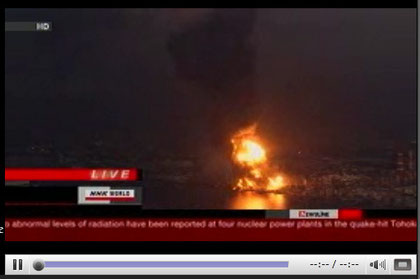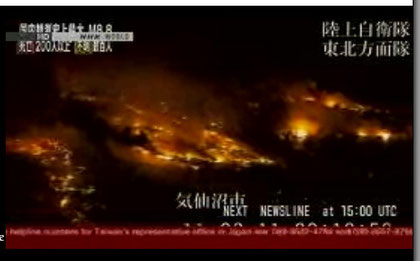
At about 2:50 p.m. today, Tokyo was hit with the strongest quake I've experienced in my ten years in Japan. I was in the office at the time. The foreign staff tend to ride out quakes like we're surfing, but after this one continued for about thirty seconds, we looked at the shaking cabinets, looked in one another's eyes, and all simultaneously discovered just how little space there really is under our desks. That was magnitude 5.
The epicentre was off the coast of Sendai. It was 8.8. That makes it the biggest earthquake ever recorded in Japan, roughly 160 times more powerful than the 1995 Kobe earthquake, which led to 6,000 deaths and $100 billion in damage. Today's quake was among the strongest ever recorded in the world.
Since 2:46 p.m. there have been more than 60 aftershocks, all magnitude 5.0 or more, one at 7.4. They're only about mag 3-4 by the time they roll through Tokyo. Our biggest problem is that the trains are all down. A few subways have started up again, but most of us are locked in our respective offices or walking home. There are 9,000 people stranded in Shinjuku station, and 13,000 at Narita Airport. There are buses, but traffic is at a standstill. Taxis take hours. All the bread and bento are gone from the grocery stores and convenience stores.
They keep showing images of an oil refinery burning in Chiba. They're just letting it burn, so it keeps getting bigger. It's too hot for firefighters to get anywhere near, and they're worried about more explosions.
Where I am, it's peaceful. We just can't move. I'm staying in the office tonight.
For hours, they were reporting a few dozen deaths in the Tohoku region (northern Japan). All the reporting was aerial. Four nuclear reactors in the region were shut down. There's no danger of radiation, but the backup cooling generators had failed, so they were shut down for safety. Most of Tohoku is blacked out. It's about zero degrees celcius. The NHK office in Sendai is still black.
Two hours ago, they found "a number of" bodies in the water near Sendai. An hour ago, they estimated the number at 200-300. That was from the tsunami.
The other problem with earthquakes in Japan is the regular use of gas for water heating and stovetops. When quakes hit, the gas lines get cut, and fires follow. This is Kesen-numa right now:

The black to the right is ocean. The black to the left is hills. The orange in the middle is basically every habitable part of the town. I think I know someone who lives here. This photo was taken by the JSDF. I don't know if any help is going to get to them. The trains in the area are all down. The roads are pretty rough on a good day.
Sendai is about 300 km north of Tokyo. The city itself seems to be largely fine. But the Sendai airport is near the coast, and it was washed out. The big concern for me is the Sanriku Coast. It's far from the main train lines, off through craggy mountains. It's a "rias" coast, based on sunken estuaries between rocky ridges. That means that any water that gets in there has nowhere to go. When I visited two years ago, I heard about a historical tsunami that wiped out several thousand people in one of the towns. Kesen-numa is at the base of that coastline.
It's ridiculous to be able to watch this and do nothing. I can't even get out of Tokyo. Nobody can.
I keep thinking of the Sumatra quake a few years ago: first there were a few thousand casualties. Then tens of thousands. A week later it was a hundred thousand. This won't be as bad. But if they're finding 200 bodies in the dark right now, the final numbers are going to be in the thousands.
The tsunami picked up cars and tossed them end-over-end. There are fifty-foot fishing boats upside-down. On the way in, the water picked up houses; then when it went back out, all the detritus just cut the remaining houses in half. The areas where the tsunami have receded look like war zones. They had waist-deep water as far north as the eastern edge of Hokkaido.
Again, this is all a few hundred kilometres north of me. But the next few days are going to be very tricky in this country.
Screencaps from NHK World:
http://wwitv.com/tv_channels/6810.htm
Earthquake information for Japan:

Write a comment
sian cox-brooker (Saturday, 12 March 2011 05:32)
Hi,
I'm a UK journalist writing about the earthquake and I'd like to talk to you about your experiences in Japan at the moment. I'd be really grateful if you could get back to me sian.cox-brooker@notw.co.uk or 02077824576.
Many thanks,
Sian